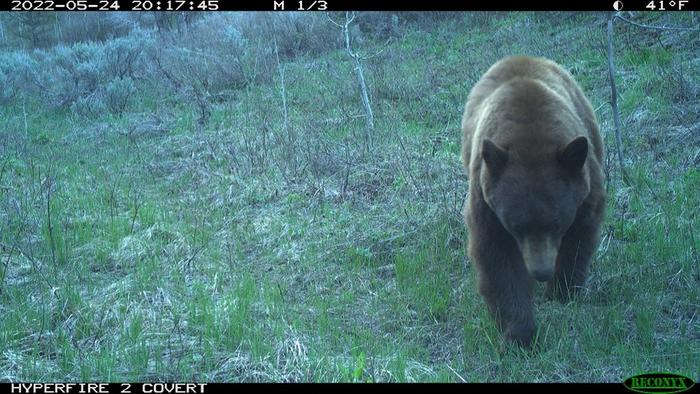FORT COLLINS, Colo., June 13, 2024 — We may go to the woods seeking peace and quiet, but are we taking our noise with us? A recent study published in the journal, Current Biology, led by scientists from the USDA Forest Service Rocky Mountain Research Station indicates that the answer is yes—and that this noise can trigger a fear response, as if escaping from predators. This new science calls into question whether otherwise high-quality habitat truly provides refugia for wildlife when recreationists are present and underscores the challenges land managers face in balancing outdoor recreational opportunities with wildlife conservation.

Credit: USDA Forest Service
FORT COLLINS, Colo., June 13, 2024 — We may go to the woods seeking peace and quiet, but are we taking our noise with us? A recent study published in the journal, Current Biology, led by scientists from the USDA Forest Service Rocky Mountain Research Station indicates that the answer is yes—and that this noise can trigger a fear response, as if escaping from predators. This new science calls into question whether otherwise high-quality habitat truly provides refugia for wildlife when recreationists are present and underscores the challenges land managers face in balancing outdoor recreational opportunities with wildlife conservation.
“Wildlife responses to recreation noise are often unobservable, and it was a fun research challenge,” said Dr. Kathy Zeller, lead author of the study. “Our study is the first to quantify responses to human-produced recreation noise based on recreation type, group size, group vocalizations, and wildlife species. Information like this can help managers balance recreation opportunities with wildlife management, which is critical as outdoor recreation continues to grow in popularity.”
The study was conducted in the Bridger-Teton National Forest, Wyoming. Researchers used a novel experimental setup to isolate and investigate the effects of recreation noise on several mammal species. Scientists placed wildlife cameras and speakers on wildlife trails throughout the study areas. Animals that entered study areas triggered speakers to broadcast different types of noise, and nearby cameras captured video of the animals’ behavioral responses to the sounds. The broadcasted noises were associated with different types of recreation such as hiking, mountain biking, and off highway vehicle use, as well as different-sized groups, and both with and without human voices. This setup allowed the researchers to observe both the immediate responses in animal behavior to recreation noise and changes in wildlife presence at the study areas. Scientists analyzed the video footage and compared how wildlife responded to various recreation noises as well as nature sounds and periods without any broadcasted noise. Key findings from the study:
- Increased fleeing and vigilance: Wildlife were 3.1 to 4.7 times more likely to flee and exhibited vigilance behaviors for 2.2 to 3.0 times longer when exposed to recreation noise compared to natural sounds or no noise.
- Reduced wildlife presence: The local relative abundance of wildlife was observed to be 1.5 times lower in the week following the deployment of recreation noise.
- Impact of group size and activity type: Larger groups, particularly vocal hikers and mountain bikers, caused the highest probability of wildlife flight, with 6 to 8 times greater likelihood.
- Species sensitivity: Elk and black bears were the most sensitive to recreation noise, fleeing from the recreationist sounds most consistently, while large carnivores were the least affected.
Outdoor recreation activities like hiking, mountain biking, and motorized vehicle use are steadily increasing, both in numbers of people recreating and number of days spent participating in these activities. Rocky Mountain Research Station research ecologist Dr. Mark Ditmer), a co-principal investigator and co-author of the study, said, “Our findings highlight the need for thoughtful planning, with potential consideration of noise mitigation measures to minimize the impact on wildlife while still providing outdoor recreational opportunities for people.” As Ditmer pointed out, “Noise from recreation can carry far beyond a trail system, so understanding how noise alone can affect wildlife is important for management.”
Other contributing authors include John Squires, Rocky Mountain Research Station; William Rice, University of Montana; James Wilder, Don DeLong, and Ashley Egan all from the Bridger-Teton National Forest; Niah Pennington, Colorado State University; Chris Wang and Jacinta Plucinski, Freaklabs; and Jesse Barber, Boise State University.
Journal
Current Biology
DOI
10.1016/j.cub.2024.05.030
Method of Research
Observational study
Subject of Research
Animals
Article Title
Experimental recreationist noise alters behavior and space use of wildlife
Article Publication Date
13-Jun-2024




